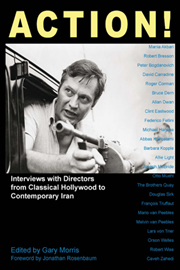Book contents
- Frontmatter
- Contents
- Foreword, by Jonathan Rosenbaum
- Editor's Preface
- Acknowledgements
- Introduction: The Art and Craft of Interviewing
- I Going Hollywood: Masters of Studio Style
- 1 Angel in Exile: Allan Dwan
- 2 “An Unhappy Happy End”: Douglas Sirk
- 3 Somebody Up There Likes Me: Robert Wise
- 4 “The Greatest Movie the World Has Never Seen”: Peter Bogdanovich and Joseph McBride on Orson Welles' The Other Side of the Wind
- 5 “Plant Your Feet and Tell the Truth”: Clint Eastwood
- II Tickets to the Dark Side: Festival Favorites
- III Blows Against the Empire: Indie Godfathers
- IV Edgeplay: Avant-Garde Auteurs
- V Women in Revolt: Artist-Activists
- VI The Canon: Brilliance without Borders
- Contributor Biographies
2 - “An Unhappy Happy End”: Douglas Sirk
from I - Going Hollywood: Masters of Studio Style
Published online by Cambridge University Press: 05 March 2012
- Frontmatter
- Contents
- Foreword, by Jonathan Rosenbaum
- Editor's Preface
- Acknowledgements
- Introduction: The Art and Craft of Interviewing
- I Going Hollywood: Masters of Studio Style
- 1 Angel in Exile: Allan Dwan
- 2 “An Unhappy Happy End”: Douglas Sirk
- 3 Somebody Up There Likes Me: Robert Wise
- 4 “The Greatest Movie the World Has Never Seen”: Peter Bogdanovich and Joseph McBride on Orson Welles' The Other Side of the Wind
- 5 “Plant Your Feet and Tell the Truth”: Clint Eastwood
- II Tickets to the Dark Side: Festival Favorites
- III Blows Against the Empire: Indie Godfathers
- IV Edgeplay: Avant-Garde Auteurs
- V Women in Revolt: Artist-Activists
- VI The Canon: Brilliance without Borders
- Contributor Biographies
Summary
Douglas Sirk's (1900–1987) career breaks down neatly into three parts. First is his German period (1934–42), which, starting with Zwei Genies (1934), comprises two dozen sophisticated melodramas and comedies of manners. His second phase began in 1943, after he emigrated to America, with the topical anti-Nazi drama Hitler's Madman (1943). During this time Sirk brought a high-art sensibility to programmers and European-style films like A Scandal in Paris (1946), for various companies. In 1950, with Mystery Submarine, he moved for good to Universal Studios where he made the films that secured his reputation as the premier 1950s melodramatist: All I Desire (1953), There's Always Tomorrow (1956), All That Heaven Allows (1955), Written on the Wind (1956), The Tarnished Angels (1958), and Imitation of Life (1959).
In Michael Stern's interview, which explores the latter two periods but also considerably more, two seemingly contradictory statements appear within a few sentences of each other: “We were deeply steeped in Art” and “For God's sake, no more Art.” These words represent, in some ways, the unique appeal of Sirk's work and the fascinating paradoxes it contains. On the one hand, he's the consummate studio craftsman, embracing the most conventional elements in cinema. His major films were all made for one of the biggest Hollywood studios, using best-selling source novels by the likes of Fannie Hurst and Lloyd C. Douglas, and featuring movie stars like Rock Hudson, Lana Turner, and Jane Wyman and “trashy” collaborators like producers Ross Hunter and Albert Zugsmith.
- Type
- Chapter
- Information
- Action! , pp. 17 - 38Publisher: Anthem PressPrint publication year: 2009



